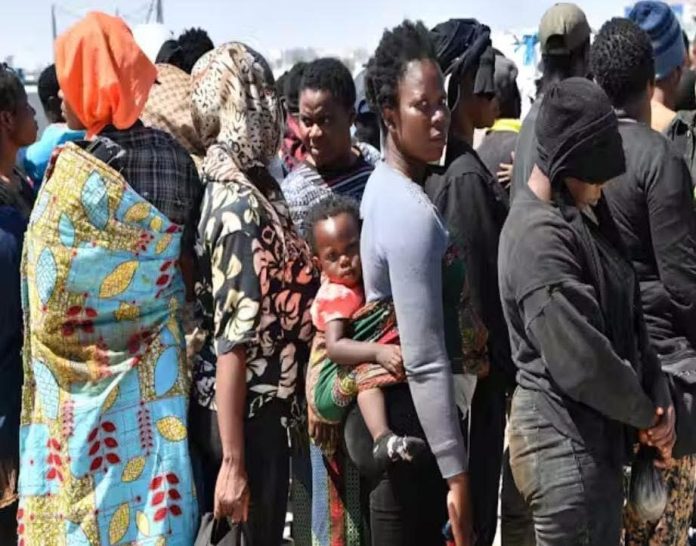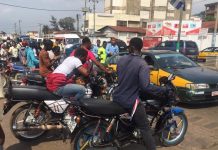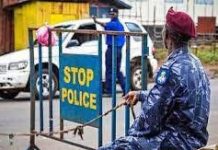By Sahr Ibrahim Komba
Late last year Justice Momoh-Jah Stevens sentenced one Prince Osman Bangura to 165 years in prison for trafficking and sexually abusing a young Sierra Leonean woman, Fatmata Samura. This historic landmark verdict not only served as a warning to traffickers but also cast a glaring spotlight on the deep-rooted and persistent issue of human trafficking in Sierra Leone.
Fatmata Samura’s ordeal began in 2018 when she was lured by Prince Bangura via social media. Over months of virtual communication, he painted a glamorous picture of wealth and romantic interest, promising her a new life in The Gambia. Convinced by images of luxury and a cash transfer of Le600,000 for travel expenses, she embarked on what she believed would be a promising future.
Instead, she found herself imprisoned in a dilapidated building, her phone confiscated, and subjected to repeated sexual abuse which culminated to pregnancy. When she found out that she was pregnant, Prince told her to terminate the pregnancy which she refused to do. He then proceeded to subject her to inhumane treatment including forcing her to drink urine and using objects in an attempt to induce an abortion. Her nightmare continued even after relocating to Ghana, where she eventually gave birth with support from a church shelter.
Her escape came through the intervention of her sister and Dr. Sylvia Blyden, former Minister of Gender and Social Welfare, who ensured her safe return to Sierra Leone and justice through the courts.
Human trafficking is a global issue, and Sierra Leone sits at a geographical and socio-economic intersection that makes it particularly vulnerable. Recent reports from the United Nations Office on Drugs and Crime (UNODC) paint a grim picture. The 2024 Global Report shows a resurgence of trafficking globally reversing the decline seen during the COVID-19 pandemic with forced labor, sexual exploitation, and child trafficking as dominant forms.
In Sierra Leone, these global trends are all too real. Despite increased awareness and improved identification mechanisms, reintegration remains a major challenge. Many young women and girls rescued from trafficking situations find themselves in dire circumstances upon return, struggling to care for themselves and their children even as government and development agencies promote available support opportunities.
To its credit, Sierra Leone has made substantial strides in combatting human trafficking. The passage of the Anti-Human Trafficking and Migrant Smuggling Act (2022) marked a turning point, introducing tougher penalties and eliminating the option of fines in lieu of prison sentences. This legislative framework complements other progressive laws such as the Amended Sexual Offences Act (2019) and the Gender Equality and Women’s Empowerment Act (2022).
In 2022, the country hosted its first National Conference on Trafficking in Persons, in collaboration with international partners like IOM, UNODC, and national NGOs. The conference launched the Trafficking in Persons Data Platform and emphasized the “3Ps” approach: Prevention, Protection, and Prosecution.
Significant operational mechanisms were put in place A National Referral Mechanism (NRM) facilitates the structured identification and support of victims. From January to December 2023, 51 victims were officially identified, 46 trafficked for forced labor and five for sexual exploitation. This marked progress compared to previous years and is partly due to better law enforcement training and public awareness campaigns.
Two critical national task forces, the Task Force Advisory Board and the Task Force Technical Committees were established in 2023 to oversee policy and case management respectively. District-level task forces are now operational in all 16 districts, further decentralizing anti-trafficking efforts.
(MOUs) have been signed with countries such as Qatar, Saudi Arabia, the UAE, and Lebanon to protect migrant workers. An agreement with Oman, a major destination for trafficked Sierra Leonean domestic workers, is pending.
The “Freedom for Our Sisters” initiative, launched by NGO Do Bold in 2020, has been instrumental in documenting cases of Sierra Leonean women trafficked to the Gulf. Using real-time data, the project sheds light on issues of forced labor, withheld wages, and abuse, offering concrete policy recommendations.
Meanwhile, Ghana’s successful anti-trafficking models highlighted in a 2023 academic study offer critical lessons for Sierra Leone. Organizations like Challenging Heights and International Needs Ghana demonstrate the effectiveness of coordinated rescue operations, psychosocial rehabilitation, and partnerships with entities such as IOM, ILO, UNICEF, and the EU.
Globally, civil society organizations continue to play a vital role. India’s Prajwala has pioneered rescue and rehabilitation efforts for sex trafficking survivors. Nigeria’s Idia Renaissance and NACTAL (National Agency for the Prohibition of Trafficking in Persons) represent broad, multi-stakeholder coalitions fighting trafficking through prevention, advocacy, and victim support.
In Sierra Leone, local NGOs have stepped up efforts to reintegrate victims and prevent new cases through education, awareness campaigns, and grassroots engagement. However, resources remain stretched thin, especially in rural areas where trafficking cases are often misclassified as irregular migration or smuggling. Despite commendable progress, several obstacles undermine the country’s anti-trafficking efforts, many investigations fail to lead to successful prosecutions, weakening the deterrent impact of the law. Technical failures hamper the anti-trafficking hotline. Border officials and labor inspectors often lack the training to identify victims, especially minors. In rural regions, enforcement is inconsistent, and public awareness is low.
As part of its future strategy, the government is developing a new National Action Plan (2024–2026) and investing in journalist training programs to improve the quality of trafficking-related reporting. The Office of the Attorney General has also prioritized border monitoring and aims to adopt a more victim-centered approach.
To consolidate its gains and address lingering shortcomings, Sierra Leone must:
Strengthen Law Enforcement and Judicial Efficiency: Specialized prosecution units and dedicated training for judges and investigators are essential to secure consistent convictions.
Expand Victim Support Services: Greater investment is needed in shelters, psychosocial counseling, and economic reintegration programs.
Enhance International Diplomacy: Finalize outstanding MOUs and ensure accountability for overseas labor recruitment agencies.
Mobilize Sustainable Funding: Resources should be allocated to civil society groups already doing vital work on the ground. Sierra Leone stands at a critical juncture in its fight against human trafficking.
The conviction of Prince Osman Bangura may be a milestone, but it is not the destination. Human trafficking remains a complex, evolving threat requiring unrelenting political will, cross-sector collaboration, and unwavering public engagement.
As the country navigates this difficult terrain, it must transform commendable policies and pilot initiatives into systemic, nationwide action. The lives and futures of countless young Sierra Leoneans depend on it.





